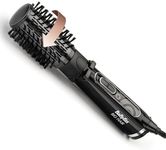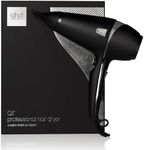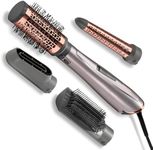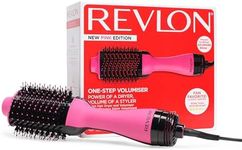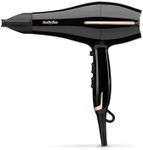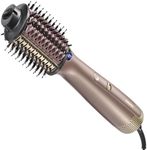Buying Guide for the Best Quietest Hair Dryer
When choosing a hair dryer, especially if you're looking for a quiet one, it's important to consider several key specifications that will affect not only the noise level but also the performance and suitability for your hair type. A quiet hair dryer can make your morning routine more pleasant and less disruptive to others. Understanding the specifications will help you find a model that balances quiet operation with effective drying power.Noise LevelNoise level is a crucial specification when looking for a quiet hair dryer. It is usually measured in decibels (dB). A typical hair dryer operates at around 80 dB, which is similar to the noise level of a vacuum cleaner. For a quieter experience, look for models that operate below 70 dB. The lower the decibel level, the quieter the dryer will be. If you are sensitive to noise or often dry your hair early in the morning or late at night, opting for a model with a lower noise level can be beneficial.
WattageWattage indicates the power of the hair dryer and affects how quickly it can dry your hair. Higher wattage dryers (1800-2000 watts) are more powerful and can dry hair faster, which might be useful if you have thick or long hair. However, they can also be noisier. Lower wattage dryers (1200-1600 watts) are generally quieter and may be sufficient for fine or short hair. Consider your hair type and how quickly you need to dry your hair when choosing the wattage.
Motor TypeThe type of motor in a hair dryer can influence both the noise level and the durability of the device. AC motors are typically more durable and quieter than DC motors, making them a good choice for those seeking a quieter hair dryer. However, they are often heavier. DC motors are lighter and may be more suitable for travel or if you prefer a lighter device, but they can be noisier. Consider how often you will use the dryer and whether weight or noise is more important to you.
Heat and Speed SettingsHeat and speed settings allow you to customize the drying experience to suit your hair type and styling needs. More settings provide greater flexibility. Lower heat and speed settings can reduce noise and are gentler on fine or damaged hair. Higher settings can speed up drying time for thicker hair but may increase noise. If noise is a primary concern, look for a dryer with multiple settings so you can adjust it to a quieter operation when needed.
Ionic TechnologyIonic technology in hair dryers helps to reduce frizz and enhance shine by breaking down water molecules and allowing them to penetrate the hair shaft. This can also speed up drying time, which might reduce the time you are exposed to noise. If you have frizzy or thick hair, an ionic dryer can be beneficial. However, this technology does not directly affect noise levels, so consider it as an additional feature rather than a primary factor in noise reduction.
Weight and ErgonomicsThe weight and ergonomics of a hair dryer can affect how comfortable it is to use, especially if you have long hair or take longer to style. Lighter models are easier to handle and can reduce arm fatigue. Ergonomic designs can also make the dryer more comfortable to hold. While these factors do not directly impact noise, a comfortable dryer can make the overall experience more pleasant. Consider how long you typically use a hair dryer and choose a model that feels comfortable in your hand.
